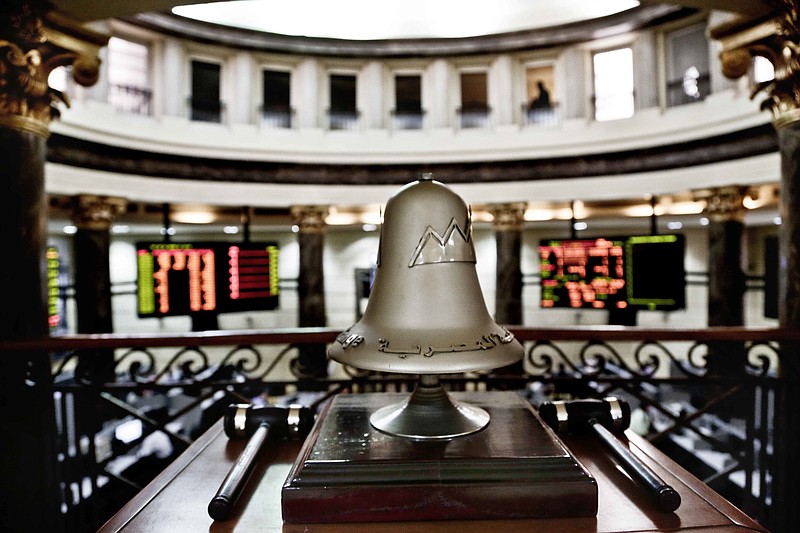CAIRO (AP) - For two weeks now, the shelf once piled with bags of sugar - for better or worse Egypt's most loved commodity - has stood empty at this grocery store in bustling downtown Cairo.
"This is nothing - they're missing even more things in my village," said Mahmoud Sulayman, a former army conscript from the Nile Delta now working as a store clerk. "People are not upset, they are angry!"
Economic pressures are bearing down on Egypt, with several key steps to be taken in the days ahead to secure a bailout by the International Monetary Fund at a time when goods shortages and ever-rising prices are prompting public outrage at the leadership of President Abdel-Fatah el-Sissi.
An escalating spat with main backer Saudi Arabia will likely be of less immediate importance for the economy, after Egypt announced the kingdom had already contributed much-needed funding to help meet preconditions for the loan.
But the Arab world's most populous country still needs some additional $2 billion in foreign reserves to reach a position of strength it agreed to with the IMF before it starts to gradually float its currency against the dollar and cut fuel subsidies, the other two main parts of the reform package the U.S.-based lender of last resort is poised to support.
With the central bank holding back its reserves for the big push, a shortage of the currency has reached epic proportions, with a single dollar costing upward of 15 pounds compared to 14 last week and an official rate of 8.9. The collapse has made an array of common imported products more expensive, and some - including spare parts, medicines, industrial goods and foodstuff - are not entering the country at all.
"It's like a sick patient in need of medicine, and the longer you delay the worse the condition gets," said Angus Blair of Cairo-based Pharos bank, who hopes Cairo can raise the final funds from international donors next week so the IMF can decide to release the loan.
Egypt's economy has been battered in the five years since an uprising toppled longtime ruler Hosni Mubarak, ushering in turbulent rule first by the army, then an Islamist government, and now el-Sissi, the former general who overthrew his elected but divisive Islamist predecessor.
Foreign currency reserves are being built up with help from abroad after they dwindled when tourism dried up over fears of terrorism, remittances dropped because of low oil prices, and Suez Canal revenues shrunk because of a decline in global trade. Inflation and unemployment rates are in the double digits.
Hopes are that by managing the currency's flotation and putting dollars into circulation gradually at rates closer to the pound's real value, the black market will ease and eventually disappear once the official value is determined by supply and demand and economic fundamentals. Another idea would be set the official rate to the same as the black market rate, or even overshoot it, in order to spark a flood of investment.
As part of the IMF-endorsed reform package, Egypt is expected to gradually lift state subsidies on fuel, basic services and food items, while aiming to support the poor with direct, often army-run welfare to offset the ensuing surge in inflation.
Some of the pain expected to increase in the near term for Egypt's 91 million people, nearly half of whom are at or near the poverty line, has already appeared.
Stores, especially state-governed cooperatives, have begun to limit purchases of certain goods like sugar, oil and rice, with sugar in particularly short supply this week. Many stores in the capital were completely out of stock, while others posted signs explaining the rationing.
Popular anger usually has little opportunity to express itself in el-Sissi's Egypt, where he has stamped out opposition and stifled dissent by jailing thousands since he led the army's ouster of the Muslim Brotherhood's Mohammed Morsi in 2013.
But a video that emerged this week of an angry tuk tuk driver criticizing the government and relentless poverty in a working class neighborhood has gone viral, gaining nearly 100,000 social media likes from an audience of millions since it was initially broadcast then pulled by a private television station.
El-Sissi, who promised to fix the economy when he came to power, has been preaching the virtues of austerity for weeks, urging Egyptians to prepare for belt-tightening and even donate money to the state. Some have said this shows he's out of touch with most average Egyptians, many of who feel they have not directly benefited from his vast purchases of military hardware, or grandiose plans to build cities in the desert.
Lurking in the background is the dispute with Saudi Arabia, whose ambassador has been recalled for consultations after Egypt angered Riyadh by voting for a U.N. Syria resolution sponsored by its Russian rivals in that battlefield. The resolution did not pass, but the kingdom's U.N. envoy publicly berated Egypt over it.
Cairo had to scramble to buy oil on the international markets after Saudi cancelled October's delivery of monthly oil supplies it had been giving Egypt on generous repayment terms. Local media reported the cancellation cost $500 million, a sum all the more important when Egypt is counting every cent.
El-Sissi has downplayed the incident, saying in a speech that Cairo remains committed to close relations with Gulf Arab allies. But it is unlikely to be quickly forgotten by investors, given that the Saudis have poured billions of dollars into Egypt to keep its faltering economy afloat since el-Sissi took power.
It remains to be seen just how the public will react if prices swing wildly and shortages become endemic once the coming steps are triggered. Shop clerk Sulayman has a clue, showing videos from his phone of angry crowds pushing their way toward delivery trucks in his village.
"I hope it doesn't get like this in Cairo, they're just too many people here," he said.
___
Follow Brian Rohan on Twitter at www.twitter.com/brian_rohan
